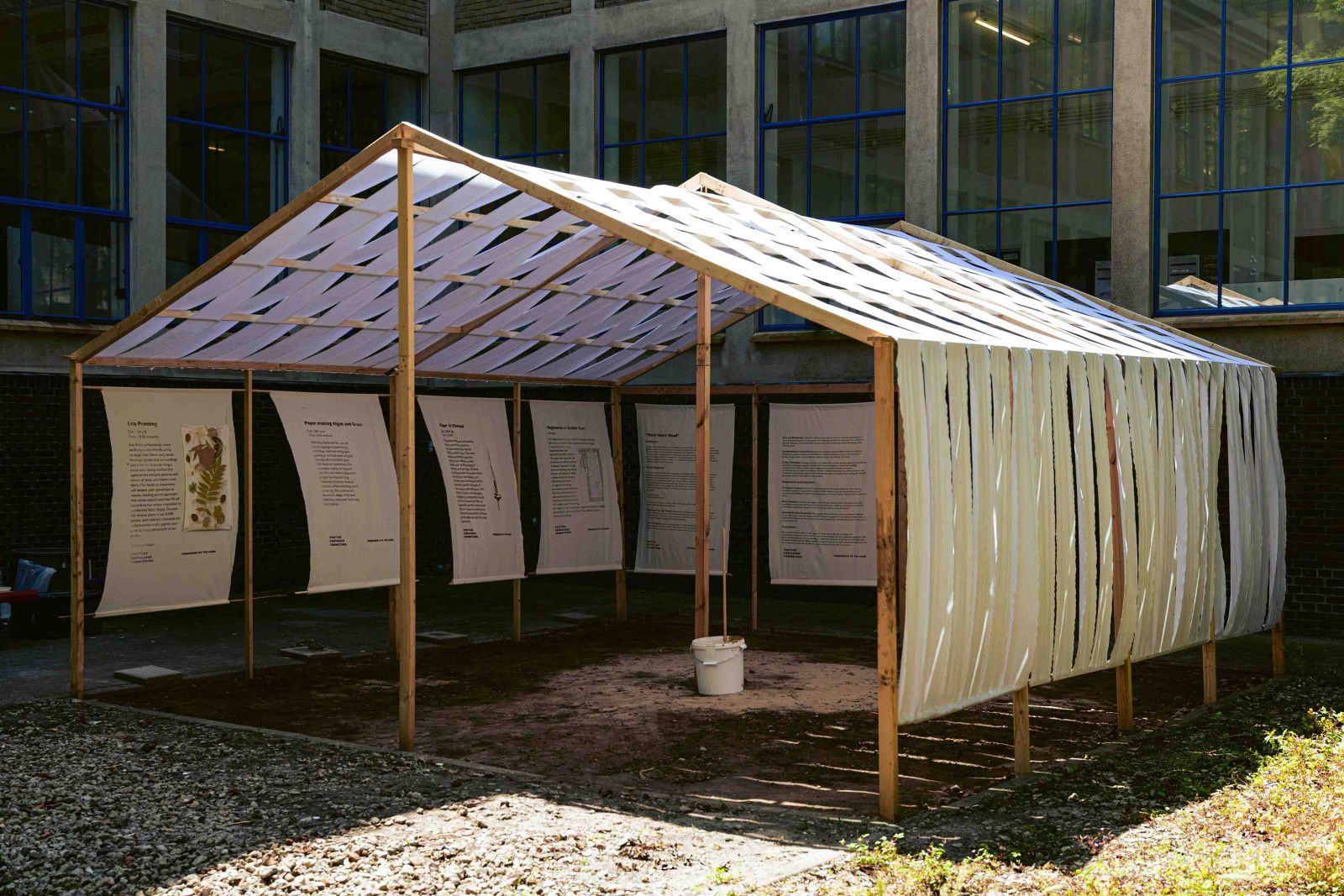
Akash Kumar
Keywords: Embodied knowledge, Knowledge transmissions, Body archive
Internship: Studio Billy Van Ktwijk, Textile Factorij, Low Food Lab
www.akashbadal.in/index.html
www.instagram.com/akash_badal_/?locale=undefined
www.linkedin.com/in/akash-kumar-0b2174162/
Nani picks the soil with her fingers and smells it: ‘We need to wait for two more weeks to sow our seeds.’ Her hands, heart, and head knew.
The audience encounters a vibrant, dynamic space of knowledge transmission designed to offer a curriculum that engages the hands, heart, and head. Crafting Contagious Connections is the culmination of a year-long participatory research project that involved people ranging from twelve to 70 years old, coming from different professions and backgrounds, with a focus on learning by doing as a method of knowledge transmission.
Its physical form is a shed in the KABK garden that houses a series of workshops and actions such as spinning, natural dyeing, and eco printing to encourage and develop hands-on learning. Participant feedback plays a crucial role in the setup; the methods of each activity are tested and refined, and participants are welcome to alter and edit upcoming workshops according to what they learned in previous sessions. The open, participatory environment enables visitors to engage and contribute to the learning process, 'while I facilitate and plan the overarching structure and programme.'
This project is rooted in my personal experiences with my grandmother, whose unique hands-on methods of knowledge transmission shaped my early learning and my relationship with nature and materials. During my formal higher education – with its emphasis on rational, abstract, market-driven, explicit knowledge – I felt a growing disconnection from the hands-on, nature-integrated learning of my childhood, as it became increasingly replaced by detached forms of knowledge. This realisation prompted me to explore and prioritise crafting as a method of thinking and learning.
My research led to the development of pedagogical methods that mirror my grandmother's teaching style, blending hands-on activities, emotional engagement, and exploration. This pedagogy aims to reconnect learners with tactile and nature-centred experiences, fostering a craft-based approach that employs local resources, and learns from the seasons and natural cycles of regeneration. It is an approach to education that values diverse methods of knowing and transmitting knowledge.
The broader relevance of my project lies in bridging the gap between vernacular, hands-on learning and modern, abstract learning. John Dewey's experiential learning theory the significance of learning through direct experiences. By integrating crafting and experiential methods, I aim to highlight the value of learning that engages the whole person – hand, heart, and head. 'Re-ordering the well-known phrase 'head, heart, and hand', I prioritise making by starting with the hand. Through hands-on making, learners forge embodied cogitation with materials, people, and spaces. Simultaneously, they reflect on their actions, engaging their minds, because new inquiry emerges along with the action-based learning. This approach is crucial for educators, designers, and policymakers who seek more inclusive and effective methods of knowledge transmission.
My project challenges conventional definitions of knowledge by promoting context-rich education rooted in life- and nature-centered design. Emphasising craft and nature-based learning, it fosters creativity and sustainability in education and beyond. It aims to redefine ways of teaching to be more holistic, engaging, and adaptable, nurturing individuals who are deeply connected to their craft, design, and the natural world.
Learning with my hands and natural materials is crucial because it fosters a deep, tactile understanding of the world, encouraging creativity and personal growth. My personal and professional experiences in both the craft sector and a large industrial company have revealed how hands-on work shapes a unique worldview. Moving to the West, I further discerned the difference between knowing and knowledge. At the Master of Industrial Design department, I learned to integrate practical skills with intellectual and emotional insights. After graduating, I aim to share my knowledge and design through a holistic approach, using hands, heart, and head to inspire others and promote a comprehensive understanding of learning and creating.